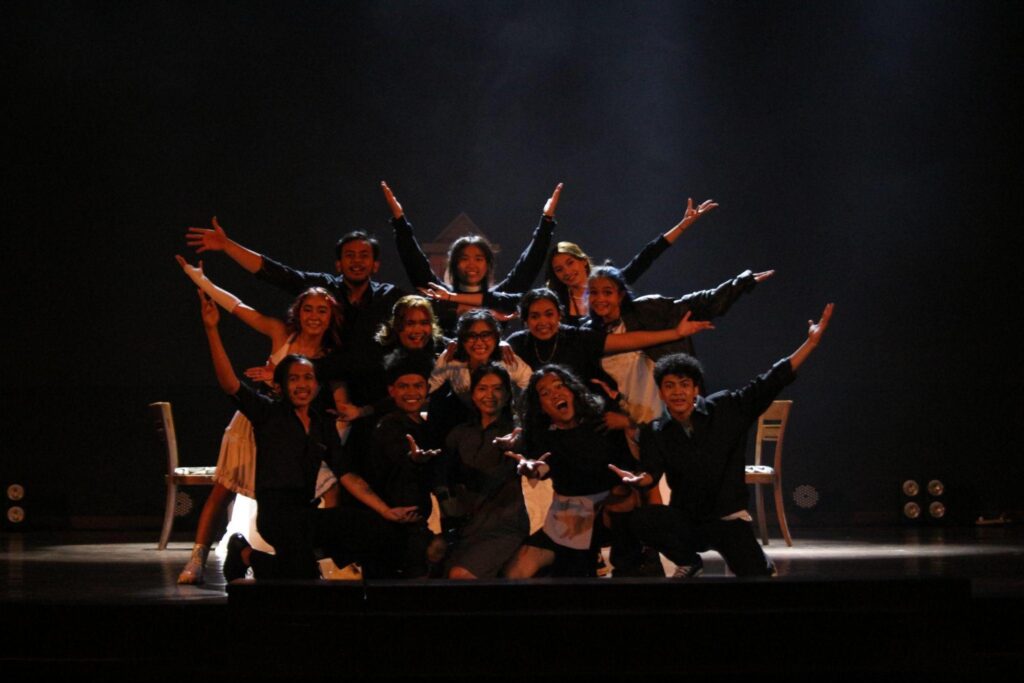
Sanata Dharma University – The eagerly awaited yearly event of the English Letters Department finally returned for the second self-produced musical play performance, Harsa 2023. Taking the motto “Happiness doesn’t always come around,” Harsa 2023 follows the story of the prestigious and “happy” Harsa family whose members are each facing internal conflicts in their own stages of life. The oldest daughter in the family, Dira, is the most distant member of the family and becomes the center of this year’s play performance.
Departing from the Moon at Noon 2022 review, our journalist team wants to continue capturing the progress of the play and envision its future potentials. Together with the team of Teater Seriboe Djendela (Pakde Agathon, Sean, Deska, Vero, Ida, and EB), we held a post-performance discussion to the following honest review of Harsa 2023. First, we would like to mention that these critiques should not be taken at face value, but should be filtered and considered along with the realistic limitations that the committee went through during the preparation of the play (e.g., money, time, human resources, etc.).
Let’s begin with the good.
THE GOOD
To start off, we should very much applaud the genius paradoxical and symbolic concept written by the scriptwriters of the play. The word “Harsa,” as mentioned by the masters of ceremonies, is derived from the Javanese Sanskrit word that means happiness. However, the story is filled with unhappy occurrences, such as facing gender stereotypes, sexual identity, poverty, infidelity, divorce, break ups, and the loss of a loved one.
This may represent the existential issue that the audience widely feels with names. Names hold expectations to be fulfilled even though it does not always fit who we truly are in reality. When it comes to the limit, these expectations may become a burden or even “ammunition” that hurts us in return.
Compared to last year’s play performance, an improvement can be seen through the selection of a theme that is more focused on one element: family. This results in a deeper significance of the story. The depicted ups and downs of the Harsa family are also relatable to the audience as it explores the issues experienced by each member of the family and their point of view toward each other’s issue.
For example, each child has a different response to the divorce of Ayu and Indra, the Harsa parents. Janu tries so hard to mend his parents’ relationship and hopes highly that the divorce will not happen. Naraya becomes gradually pessimistic and silent as she is overwhelmed by the whole situation. Dira chooses to burst out her anger and escape through drinking. The dynamic between them represents the similar struggle that we might feel in facing the different personalities of our own family members.
Aside from the main story, the all-out energy of the actors and actresses in the play is also worth acknowledging. Their stamina and endurance to act, sing, and dance throughout the performance shows just how much practice they had in the 9 months of preparation.
Lastly, our appreciation also goes to the property and setting team for their attention to detail. In the scene of Apollo band practice, we almost thought that the speakers, amplifiers, and guitars were all real! Only when we took a closer look did we realize that they are made of styrofoam. From this, we can also see their effort to provide a realistic experience of the play.
THE BAD
The pacing of the story and the characters’ development felt unearned and seemed lacking in effort. They were trying to tackle many issues within the span of approximately one-hour performance, and it was reasonable for them to try to include each of the characters’ issues. But in the end, all of those issues weren’t solved evenly. Everything felt very rushed. The issues could be explored more if the story only focused on one or two conflicts, for example, the reason Dira distances herself from her family or the rocky relationship between Ayu and Indra.
Another impact of the rushed storyline was Dira’s death in the end. The loss of Dira felt dull because there was no conclusion to her character growth. It felt like Dira’s characterization changed 180° in a second, from a distant, selfish, and self-centered person to suddenly a kind and caring one, and her death didn’t resolve anything. The music and the actors’ acting were good, but Dira’s death felt like it existed just for the sake of the story being sad without nuance behind it.
Even though Harsa 2023 is a musical performance, unfortunately, the musical aspect was not the strongest element. The music only served as an ice-breaking moment in between scenes. When there was a full dialogue scene, it’d be better to use instrumental music to emphasize the emotions. The tense arguing family scene, or the ones where Dira and her friends had a fight, could have a short riff of a guitar or piano being played over and over.
The choice of music genre throughout the play could also use some improvements. One minute the audience was immersed in the chilling and mystique moment of the opening, where they saw the spirit of Dira and her family frozen in the background in a grieving state, and suddenly all hell broke loose with The Greatest Showman, a thundering and grandiose song, being performed. It can also be noted that not all actors should be singing even if it’s a musical performance. It was quite unnerving when Dira’s mom held the spotlight in the Born This Way scene, where the spotlight was supposed to be about Naraya and Dira.
One common knowledge about theater is to over-dramatize everything. Aside from being expressive, the actors need to make big gestures on stage so the audience can understand their emotions based on body language. Though, the dramatization in Harsa 2023 was overdone. When the actors try hard to sell strong emotions, it can be quite hard to connect with them because it isn’t realistic.
The ending scene, where all the characters aside from Dira, were crying hard was a bit difficult to watch. The scene took a really long time and was too dramatic. Not all people grieve by crying hard. There are many ways for people to show their grief. For example, they can suddenly feel numbness in their body, their brain can’t really catch up with all that’s happening, and they just stare at everything and everyone with hollow eyes.
Continuing about the over-dramatization, it was worth noting that the choreography in Harsa 2023 was solid. However, musical theatre is not about actors acting and singing separately. Harsa 2023 felt like a concert sprinkled with acting in the way, grand choreography, and solid singing from the actors.
Musical theater is a theater that has musicality as the element. However, it is still theater in essence. The narration has to be well built between the narration and the music. Music and acting should go hand in hand in harmony. It was okay not to use choreography for musical scenes. A scene in which the Harsa family gathered around the dinner table after The Greatest Showman performance could be played differently by having the characters talking casually on a singing note.
As for the technical aspect, it was unfortunate that in some scenes, the microphones were not working properly, though kudos to the actors who still continued to wonderfully sing and act!
Apart from the microphone problem, a few lights were also being turned on out of nowhere, and the sudden brightness from those lights was not pleasant. Nevertheless, the lighting work in Harsa 2023 looked absolutely glamorous overall.
In the end, all appreciation and praise should be given to the entire Harsa 2023 team. This year’s performance showed a huge improvement from the previous one. The details in the properties were absolutely brilliant. The make up, hair, and costume were good, and the lighting made the performance look even more grand. All in all, the talent, passion, and dedication of the entire Harsa 2023 team will be acknowledged forever.
Journalist: Agnes Seraphine, Kenar S. Kanayana
Editor: Nanda Pratama Putera Tomasila, Ruth Tirza Arina (QC)
